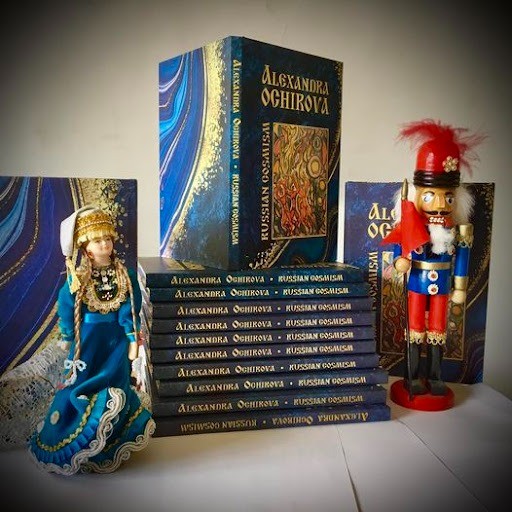A Bridge to Cross Times
By: Ashraf Aboul-Yazid
Alexandra Ochirova’s book “Russian Cosmism” opens the doors to an extraordinary world where philosophy, art and poetry are intertwined. This book represents a significant contribution to the study of Russian cosmism, covering not only national, but also universal aspects of the human soul.
Alexandra Ochirova, a modern poet and thinker, reveals to readers her unique understanding of Russian cosmism; transporting them to a world where philosophy, poetry and cultural traditions merge into a single whole. In her works we find not only deep reflections on space and human consciousness, but also warm admiration for the cultural heritage and wisdom of our ancestors.
This book becomes a bridge between past and future, tradition and innovation. It provides readers with the opportunity to immerse themselves in the secrets of Russian cosmism through the eyes of Alexandra Ochirova. In her poems and philosophical reflections we find not only national identity, but also a universal approach to the eternal questions of humanity.
Flipping through the pages, we hear echoes of the past, because the great Russian artist and thinker Nicholas Roerich left his mark on history. Alexandra Ochirova respects his legacy, building her creative searches as a special bridge between eras.
The significance of Russian cosmism, especially in our modern times, is undeniable. The book "Russian Cosmism" offers readers a unique opportunity to explore the mysteries of this philosophy through the eyes of Alexandra Ochirova. Let this book serve as a fascinating guide to the world of cosmic thought and cultural heritage.
Alexandra Ochirova presents to the world her interpretation of Russian cosmism, in which she explores the relationship between cosmic processes and human existence. Her poetic and philosophical approach helps readers comprehend and rethink their ideas about the Universe, about human beings and their place in this endless cosmos.
In her poems and essays, Alexandra Ochirova examines Russian cosmism not only as a philosophical doctrine, but also as a living, dynamic worldview system that is capable of inspiring and awakening consciousness. She explores deep questions about the meaning of life, the infinity and limitations of human experience, and the eternal search for harmony between man and the cosmos.
"Russian Cosmism" by Alexandra Ochirova is not only an academic study, but also a personal journey of the author into the depths of cosmic philosophy. She shares her thoughts, drawing on scientific knowledge, historical events and personal experience, creating a mosaic of thoughts that forces readers to think about the grandeur of the Universe and the role of man in it.
The book is intended not only to inform, but also to inspire, offering a new perspective on the relationship between man and space. She invites readers to think about how cosmic laws and principles can be applied in everyday life, how they can help us achieve personal and collective harmony.
And as a UNESCO Ambassador, Alexandra Ochirova has a clear message; a message for the peace of mankind and the preservation of nature. She has the wrath of fire, but she hopes that harmony will prevail, embracing humanity with is mercy:
So the fogs lay down on the grass
On the Russian field - ripe wheat.
And the sky is at the highest height,
Where in the clouds it is as if someone's face.
And the horizon that you can’t catch up with your eyes,
And the skies burning with enamel ...
It’s good that people don’t know
Everything to the end from the book of the universe:
The laws and calculations of being
To just live in the harmony of creation
And measure the sky and fields with a look,
Reading secrets in the stars and signs.
And, as in a window open in the morning,
Seeing the world, freeze with admiration,
Combining love and beauty
Like an eternal code of earthly repetition.
"Russian Cosmism" by Alexandra Ochirova is a journey into the depths of the human spirit and cosmic destiny. This is an invitation to think, explore and comprehend the eternal mysteries of the cosmos that have troubled humanity for centuries.

Comments